|
Appledore Road
Stone-in-Oxney
01233 758246
https://www.oxneyferry.com/
https://whatpub.com/ferry-inn
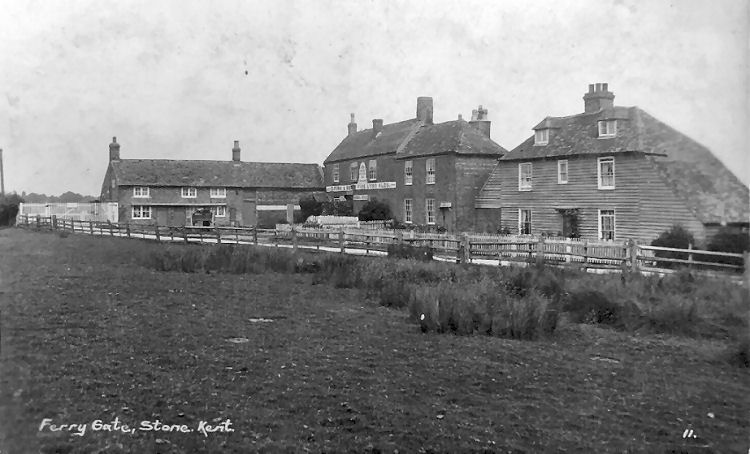
Above photo, circa 1908, kindly supplied by Rory Kehoe. |
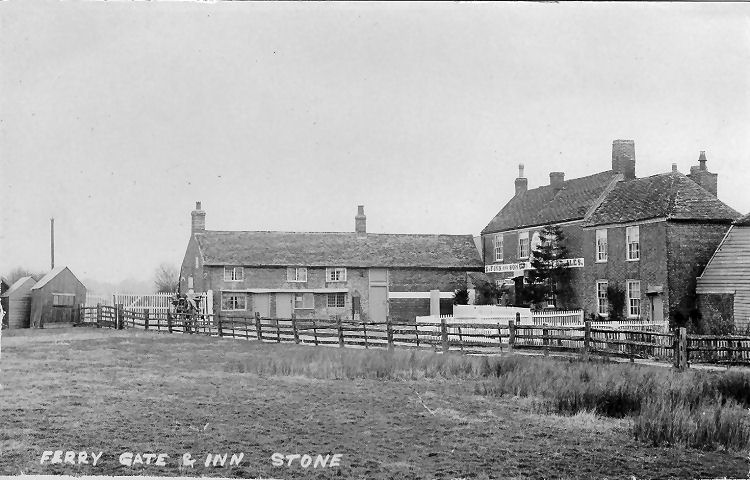
Above postcard, 1910, kindly sent by Rory Kehoe. |
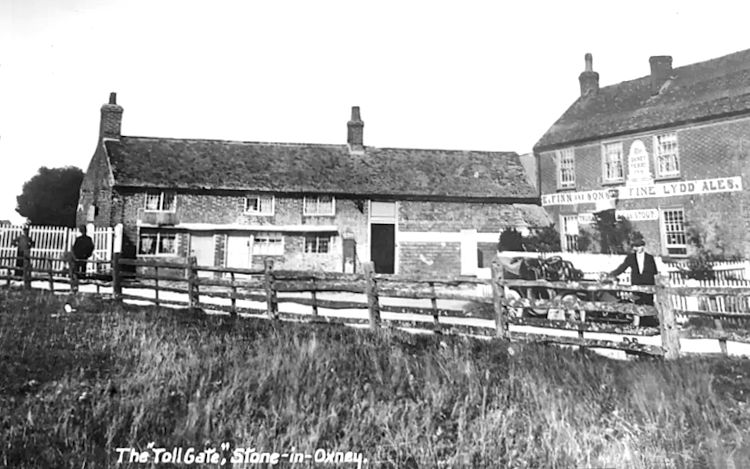
Above postcard, 1911, kindly sent by Rory Kehoe. Showing the Ferry in
the livery of Edwin Finn's Lydd Brewery. |
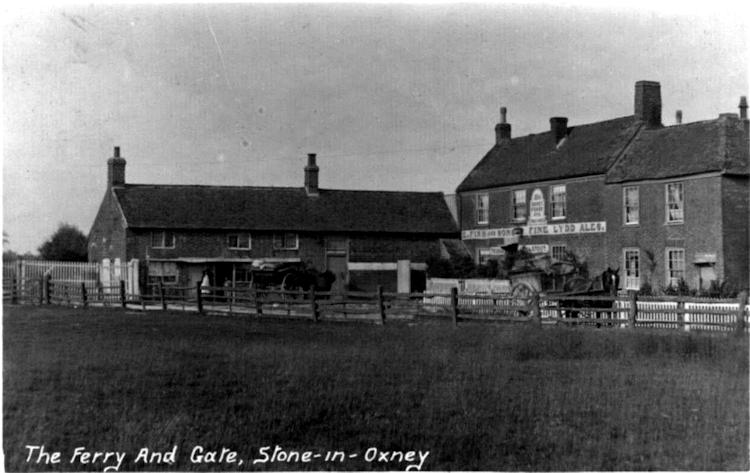
Above postcard, circa 1914, kindly sent by Rory Kehoe. The sign looks
like it says "Stone Ferry Inn." |
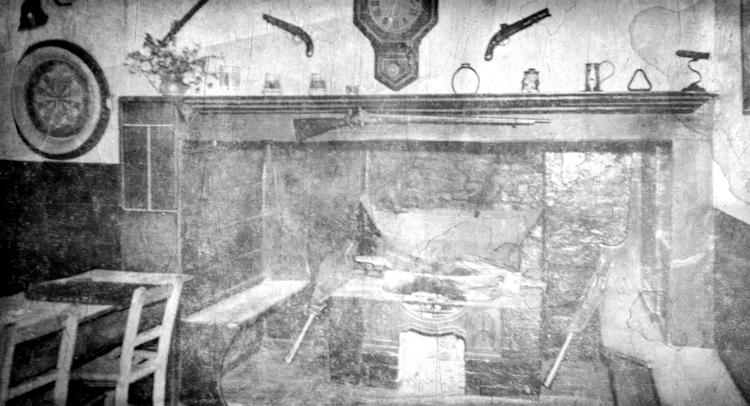
Above photo, date unknown. |
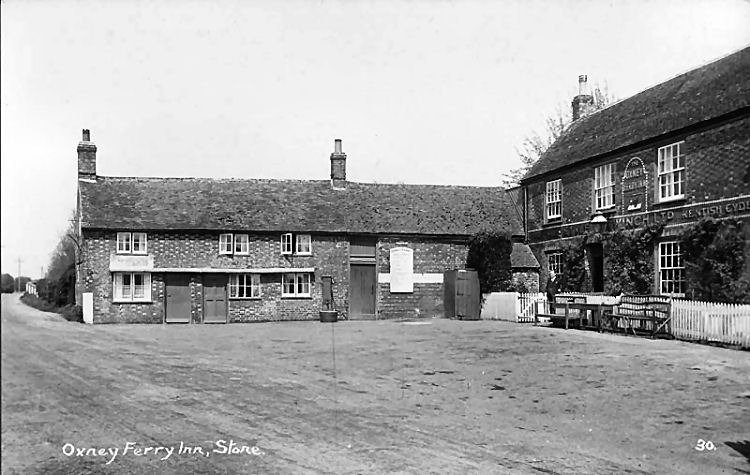
Above postcard, 1950s. |
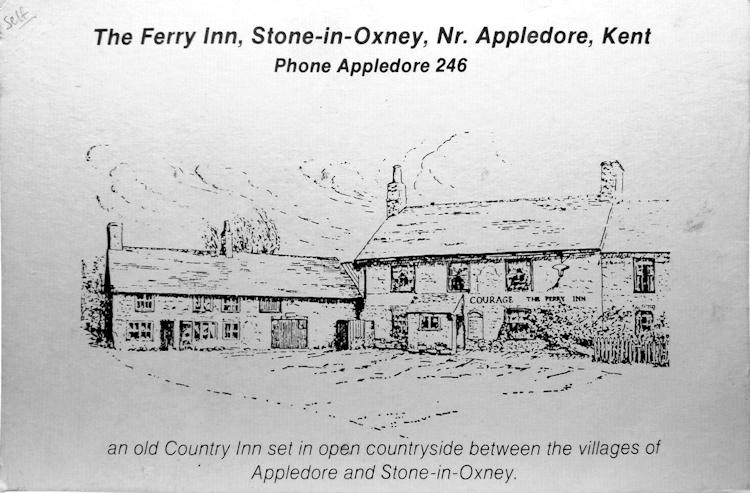
Above drawing, date unknown. |
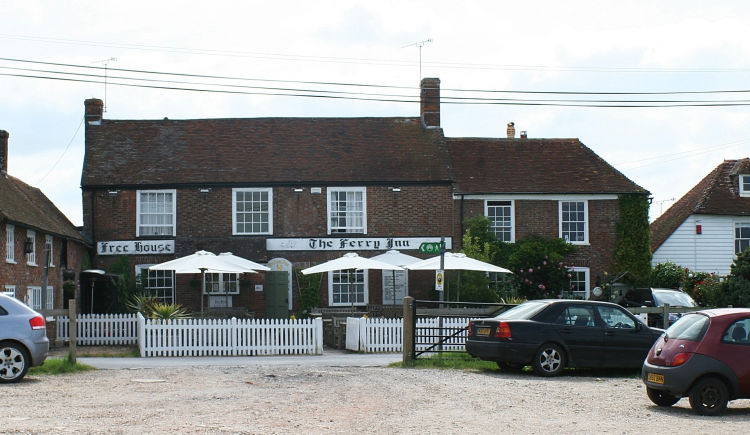
Above photo 2009, from Chris Louis Green. |
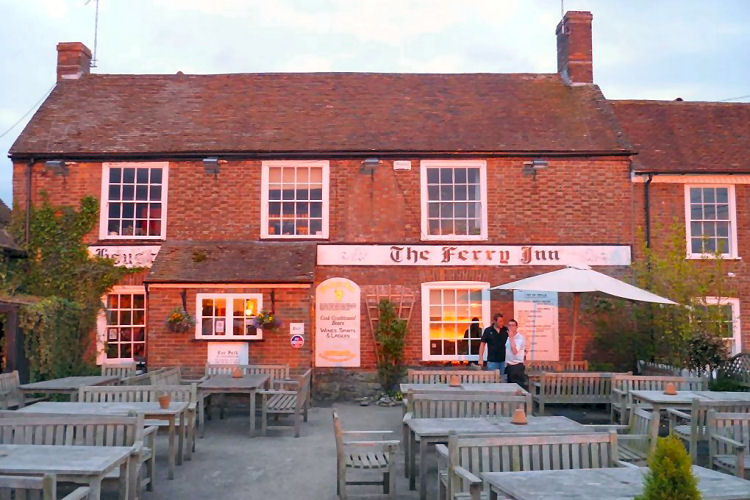
Above photo, 2017. |
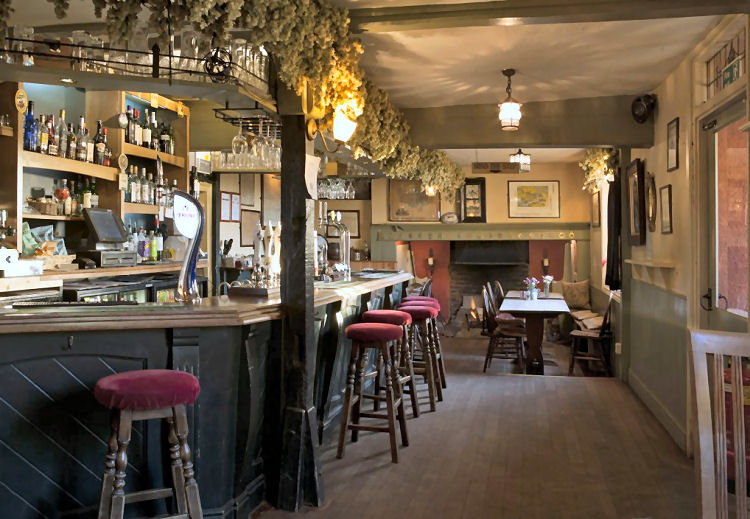
Above photo showing the bar area 2017. |
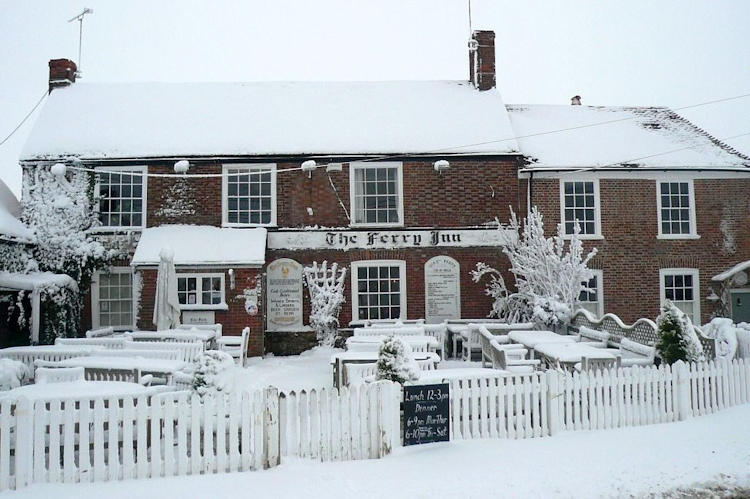
Above photo circa 2023. |
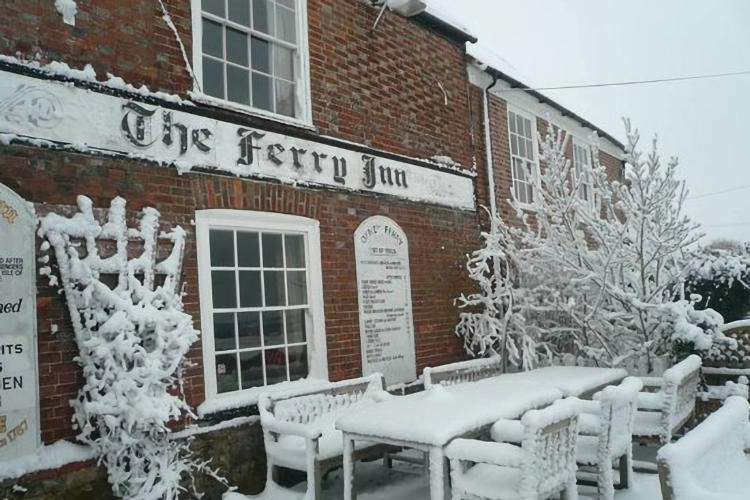
Above photo circa 2023. |
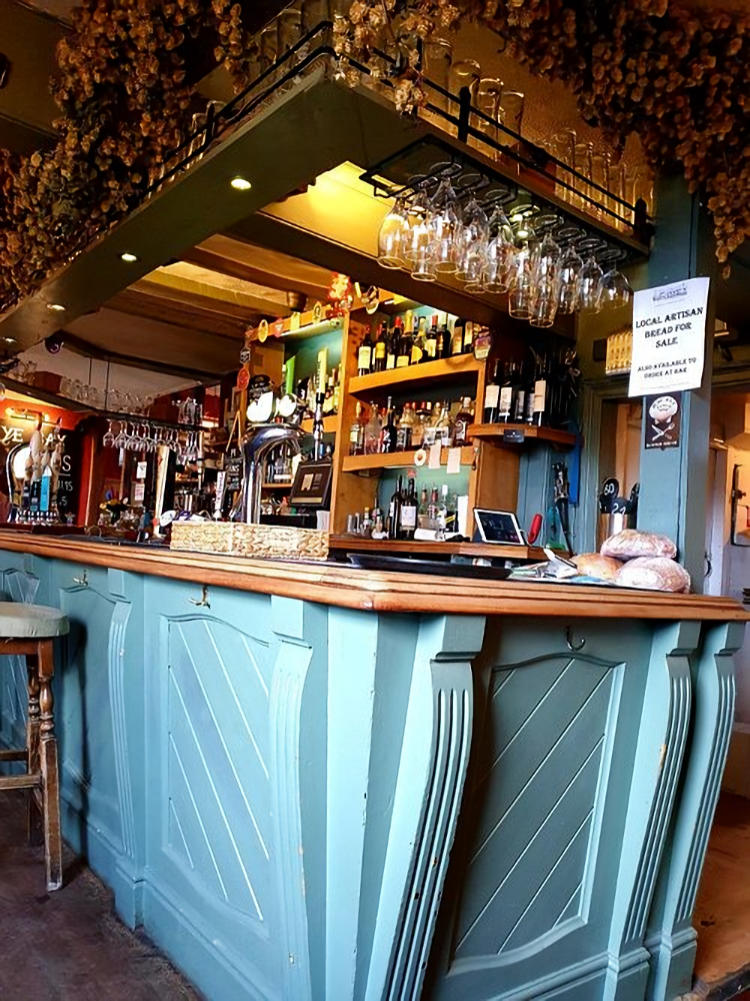
Above photo 2023. |
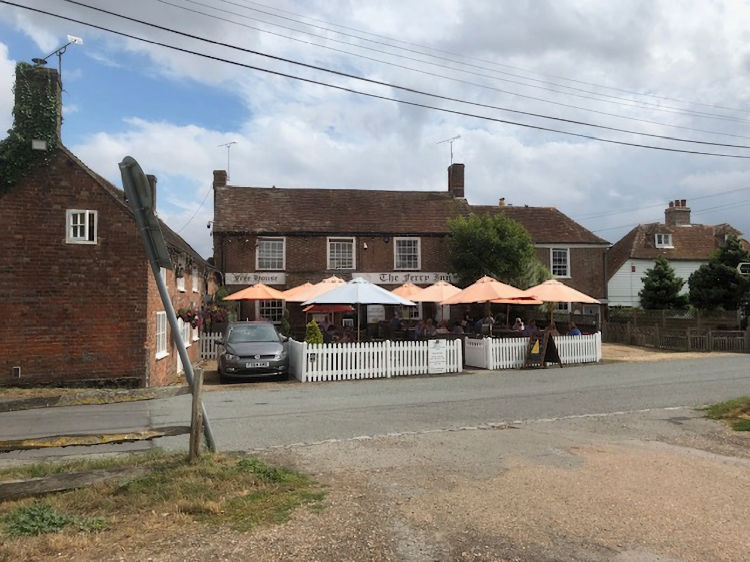
Above photo, 2024, kindly sent by Michael Harris. |
The building was built in 1690 to refresh and accommodate the
travellers who would then cross over the outlet of the River Rother to the
mainland! The existing narrow watercourse you see today is called the
‘Reading Street Sewer’ (or ditch, or dyke) and is the Southern edge of the
Old Rother, which was up to a quarter of a mile wide in parts at the time. I
believe it was originally known as the "Black
Ox," but don't know the year it changed name yet.
The then coastline was near to where the Military Road and canal is
today, and if you drive from Rye to Appledore and look to your left, you can
clearly see the original ‘Stone Cliff’, the ancient shoreline of the Isle of
Oxney.
The "Ferry Inn," along with many other buildings on the Romney Marshes
and other nearby areas were Smuggler’s haunts, and in the corner of the main
bar (by the Inglenook) can still be seen an Owler’s (smuggler’s) window,
where people inside could signal to the smuggler’s boats to let them know
whether it was safe to land the contraband. Knock House at the bottom of
Knock Hill was virtually on the coast and was the HQ of the Customs and
Excise men.
During the Napoleonic War, troops were quartered in the upstairs rooms
and attic in case the French invaded. One soldier was murdered by another
upstairs after falling out over the favours of a local lady! The murderer
was executed at Chatham. There was also a barracks at Reading Street and
also an army racecourse.
The Isle of Oxney, on which the Ferry stands, was a separate island from
the Isle of Ebony (also called the Chapel Bank), which you can see from the
bar windows quite clearly. You can see all this on one of the many maps in
the bar, ‘Hasteds Hundred Map’, which also shows that even after the waters
diminished and the bridge was built, the road North only went as far as
Court Lodge Lane and not straight on to the old school crossroads, so that
travellers to Tenterden, Ashford and further afield had to go right (Court
Lodge Lane) through Appledore (B2080) and onwards.
Finn's (see picture circa 1911) owned pubs on and all around the Romney
Marsh area and was, surprisingly, quite a large concern, with over 40 tied
houses. However, it all came to an end in 1921, when Style & Winch moved in
and acquired Finn's.
The Ferry was originally a Free House, once owned by the Deedes family
from Saltwood Castle (Bill Deedes MP’s ancestors). It was purchased by Edwin
Finn brewery (Lydd) and leased by them to Style and Winch (Maidstone) who
later purchased it from them. Courage Barclay Simmonds, later ‘Courage’
bought out Style and Winch, in 1953. It was sold by Courage as a Free House,
which it still is today.
|
Kentish Gazette, Tuesday, 11 March 1856.
Corn Stealing.
A waggoner named Rose, in the employ of Mr. Thomas Baden, of
Brookland, was charged with stealing, and Frederick Frampton, of
Stone Ferry, with receiving a quantity of beans, the property of Mr.
Baden. Rose confessed his guilt, and was committed for three months'
hard labour. Frampton, who denied all knowledge of the affair, was
committed for trial at the next quarter sessions.
The sentence on the prisoner was that he be imprisoned one week
on the first offence, and at the expiration of that period twelve
months in the House of Correction for the second.
The prisoner before leaving the bar desired to address the court,
which he was not allowed to do and he was conveyed into the prison.
|
|
From the Kentish Express, 12 April, 1856.
East Kent Quarter Sessions.
These Sessions were held on Tuesday last at Saint Augustine's,
Canterbury, when the prisoners for trial were less in number than
usual at this season of the year, a circumstance that may in some
way be accounted for from the recent Spring Assizes having disposed
of the various offences committed in the Division during the past
quarter, and from the operation of the recent enactment which
enables the magistrates to dispose of petty larceny by summary
conviction.
The court, which was not not fully attended by the magistrates of
the county as is usual, was composed of J. B. Wildman, Esq.,
(chairman,) the Ven. Archdeacon Croft, Kev. K. Biron, E. H. K.
Hugesson, G. Gipps, E. Foss, T. H. Mackay, J. J. Lonsdale, W.
Farley. M. Bell, W. Oxenden Hammond, A. Munn, E. C. H. Wilkie, Esqs.,
&c., &c.
Receiving Stolen Goods.
Thomas Stoneham, for receiving about one bushel of mixed beans and
oats, value 5s.; and Frederick Frampton, for receiving about seven
gallons of beans, value 5s., the property of Thomas Bayden, well
knowing them to have been stolen, at Stone, on the 19th February,
1856.
These prisoners, although separately indicted, and unconnected in
the transactions as far as the evidence showed, may be considered as
immediately conjoined in one and the tame system of plunder. The
facts are therefore given together in our report.
Stonham, it was stated, is a baker and grocer, and post-office
keeper, at Iden, near Rye, in Sussex; and Frampton, a publican, at
Stone Ferry, near the Isle of Oxney,
("Ferry Inn") in Kent, and both of them
reputed as men in good circumstances, and highly respected in their
neighbourhood.
True bills on three different transactions were found against each
of them, charging them with having on various occasions purchased of
the prosecutor’s waggoner, oats and beans for a trilling
consideration, they well knowing that they must have been stolen.
Mr. Addison conducted the prosecution under the direction of Mr.
Stringer, solicitor, at Romney; and Mr. Francis defended the
prisoners on each indictment, instructed by Mr. T. T. Delasaux.
The cases occupied the greater part of the day. Mr. Francis
succeeded in obtaining an acquittal for Frampton on one of the
indictments, but was not so successful in the others, for which the
prisoners were put on their trial. The third Indictment against each
prisoner was withdrawn after being formally read by the clerk of the
peace.
By the evidence in support of the charges, it was shown that a
youth, in the employ of the prosecutor, as waggoner’s mate, told the
bailiff (Sir. Hyder) that the waggoner was taking corn from the farm
at Brenzett, as also from that at Sandhurst, and selling it to both
Stonham and Frampton. This information was given in February last,
but the transactions went over a space of four months previously.
The waggoner, whose name is Rose, was apprehended on the charge, and
upon admitting his guilt, was summarily dealt with by being
sentenced to three months’ imprisonment, with hard labour, and was
now produced as a witness to corroborate the statement, made by the
boy Bowles, the waggoner’s mate, and it may be best for the sake of
brevity to give Rose's own statement of the transactions.
He said, that during the month of September, Stonham asked him to
get a little corn for his pony, and that he (Rose) did on the 3rd of
October, or about that time, take to him about a bushel of oats and
beans, which had been supplied him at Sandhurst farm for his horses.
He gave it to Stoonham, at the "Stone Ferry" public-house, who paid
him 1s. 6d. for it. A few weeks after, he took from the granary at
Brenzett half-a-bushel of split beans, which Stonham had, and gave
him 9d. In February last, he supplied Frampton with a quantity of
beans procured in the same way, for which he (Frampton) gave him is.
On another occasion he supplied Frampton with about six or seven
gallons of beans, for which he had had no consideration; and at
length when he carried another parcel to him Frampton refused to let
them be left at his house, saying that the boy Bowles had been
chattering about it, and that there were parties employed to watch.
He, (witness) in consequence, took the last named parcel back, and
restored them to his master's granary.
The above is an epitome of the evidence in support of the whole of
the indictment, excepting that it was stated that Stonmam also
received some corn on the 9th of December, in like manner, but no
evidence was adduced to support the charge.
For the defence of Stonham it was attempted to be shown, that on the
3rd of October Stonham was at home at Iden all day, and consequently
could not, have been at "Stone Ferry," some four or five miles
distant, but by an ingenious system of cross-examination pursued by
Mr. Addison, it was shown that the witnesses, in support of an
alibi, though not wilfully stating that which was not true, were
speaking from data that could not be relied on. G. A. Lamb, Esq., a
magistrate of Sussex, gave Stonham an excellent character for
honesty and propriety of conduct, as did other respectable persons
in his neighbourhood, and several witnesses as to character were
examined on the part of Frampton, but the weight of evidence was too
great on the minds of the jury for this to shield the prisoner from
conviction.
In passing sentence, the Chairman remarked on the enormity of the
offence of which they had been convicted, observing that persons
moving in the sphere of life they (the prisoners) did, ought to do
their best to protect their neighbours' property, in place of which
it had been shown to the satisfaction of the jury and the Court,
that they had encouraged poor and ignorant farm servants to rob
their employer.
The sentences were:— Stonham, one week and twelve months' hard
labour; Frampton, twelve months' hard labour.
|
|
Thanet Advertiser, 2nd February 1924.
EX-COASTGUARD AND SMUGGLERS' HAUNT.
The many Broadstairs friends of ex-Coastguard W. J. Rickaby will be
interested to learn that he is now the landlord of The "Ferry Inn"
at Stone-in-Oxney, near Appledore.
Mr. Rickaby's new duties are not confined to catering for the inward
needs of travellers and others, but he also fills the somewhat
mediaeval role of toll keeper upon the King’s highway. This is a job
that would have eminently suited Air Raid J
|
15th April 1856.
CONVlCTION OF A PUBLICAN.
Frederick Frampton, rendered in court, charged with having on the
19th of February, received seven gallons of beans, the property of
Thomas Bayden, at Stone, well knowing them to have been stolen.
Mr. Addison, who prosecuted, spoke of the heinousness of the
offence, which he regretted to see was now but too common, of
servants robbing their employers, and celled Thomas Bowles, a lad,
in the service of prosecutor as wagoner's mate. - William Rose was
the wagoner.
On the 19th of February, a quantity of beans, taken from the barn
chest by the wagoner, was placed in the wagon, when they were going
together to Wittersham, and at Stone Ferry it was delivered up by
the wagoner to prisoner, who kept a public-house there. The beans,
which were in a sack, were placed in a little out-house, and on the
wagoner telling him what he had got for him, the prisoner gave him a
shilling. Witness told his master of the affair next day. When they
went to the house again on the 25th, on their road to Wittersham,
prisoner said he had a suspicion there was some man there on the
watch, and told the wagoner to go on and take no notice.
Cross-examined by Mr. Francis:- He did not think of telling his
master who he saw the wagoner take the beans out of the chest,
though he knew it was wrong; he told him of it next day. They had
been in the habit of baiting the horses at the prisoner's house,
with the corn taken from his master's stables. They usually left the
corn in the little out-house and baited on their return. he was
close to the wagoner when the prisoner gave him a shilling. On the
day in question they baited their horses, but not with that parcel
of corn to which be had alluded; they had two parcels. His master
had told him he should have some money when the case was over—he did
not know how much—he had heard somebody say it was £20.
Re-examined:- He lived 29 miles from here, and left home the
previous afternoon, and the bailiff told him that he should have
some money—he never said anything about £20. When he communicated
with the bailiff, he told him what to do.
John Hyder, bailiff to prosecutor, spoke of the communication made
by last witness on the 19th February, about what he had seen in the
stable, when he told him to look after the wagoner. He had made no
offer to witness of any money.—
Cross-examined:- Rose, the wagoner, was in gaol, under a conviction
for the same offence.
Mr. Francis, in addressing the jury for the defence, complained of
the appeal that had been made to them as farmers to invoke their
feelings against the prisoner for the peculiar offence of corn
stealing; and asked whether they would convict on the evidence of a
stupid witness, who by the last answer of the bailiff, stood proved
guilty of perjury. He argued that the corn had been left as usual at
prisoner's for the baiting of the horses and the money that had
passed was merely that which had been given in change for the
allowance.
George Trice, publican; Stephen Wenham, constable of Stone; Thomas
Wellard, farmer; G. Halberson, farmer and grazier; and Charles Hoath,
were called to character, which they spoke of as very good; and
others were in attendance to depose to the same effect, but it was
thought unnecessary to trouble them.
The Chairman having summed up, the jury returned a verdict of Not
Guilty.
The prisoner was further charged with having stolen seven gallons of
beans the property of the same party; and Mr. Addison, in opening,
repudiated, what had been imputed to; him, any desire to press
unfairly on the prisoner, and as regarded the lad to whom perjury
was attributed, that there was no reason for concluding that, as all
that had transpired was probably what he had heard of receiving
money for coming to the trial; and it could not be supposed he would
have attended without, as he could not afford to lose the time or
bear the expenses of travelling. The learned counsel related that it
was a charge for an offence of a similar nature to the last,
committed on the subsequent Saturday. He then called the lad again.
Thomas Bowles who deposed that in consequence of what he was told by
the bailiff in respect of the last case, he was on the look out; he
kept his eyes open—and on the Saturday following he (witness) took
seven gallons of beans out of the chest as the wagoner bade him, and
put them into the wagon, which rent to Wittersham, and stopping at
the prisoner's house, the beans were taken into the outhouse by the
wagoner, the prisoner standing at the gate the same time. When they
returned the wagoner sold the beans, but he did not see any money
given. They took some beans to bait the horses and some to sell—the
wagoner told the prisoner he had some beans for him.
Cross-examined:- Prisoner said nothing—it being the first time, and
not the second, that he heard the conversation about the beans. They
baited at Wittersham that day, and prisoner refused to allow them to
bait their horses.
Re-examined:- He gave as his reason that it was because he thought
that same man was watching.
By the Court:- What he meant by the wagoner selling the beans was
that Rose told him that he had sold them and had got something for
them, but he did not say how much.
William Rose, the wagoner, was then brought up from the House of
Correction, on the order of the Court. He spoke of the second
occasion when he went with some beans which he left at prisoner’s
house; he placed them in his lodge under his directions—he gave him
1s. the first time, but nothing the second; he expected that he
should receive on the second occasion the same as before, which was
his reason for taking some again. He saw the prisoner in the road,
who asked if he had got any thing for him to-day; to which he
replied that he had, when he told him that he had better not stop
that day as there was somebody on the watch, for his mate had been
talking about it. Consequently he did not leave the beans, but took
them back again.
Cross-examined:- He used to bait his horses there; he did not leave
any when going to Wittersham on the second occasion spoken of, but
left them on his return; he told prisoner on one occasion that he
had got a few beans for Mr. Stonham, which was the beginning of
it—he never told him that he should not bait his horses there again.
Hyder, the bailiff, merely deposed that in consequence of the
communication he told the boy to keep his eyes open.
Mr. Francis, for the defence, argued against the prisoner having
received the beans knowing them to have been stolen, or that there
was any proof of his having received them at all.
A third charge imputed to him a similar offence on the 27th, the
particulars of which were briefly detailed, though the learned
counsel, Mr. Addison, refrained from prosecuting it. He stated that
on this occasion when the corn was taken to prisoner, he refused to
take it, as it appeared that the thing had become blown. The witness
had been told to keep his eyes open and no doubt he did so; and
prisoner having his apprehensions, the corn was conveyed to
Wittersham and afterwards returned to the stable. He should, having
obtained a conviction, withdraw this charge.
The Chairman, in sentencing prisoner, said the Court perfectly
coincided with the verdict of the jury in finding him guilty of
having received these beans knowing them to have been stolen. There
was every reason to believe that this practice had been carried on
to a very great extent, much to the injury of the farmers of the
neighbourhood. Were there no receivers there would not be found so
many persons prompted to crime as there were. He sentenced prisoner
to twelve months in the House of Correction.
On leaving the bar the prisoner exclaimed that he had been tried
very wrongfully, for he never had or ever touched a bean. |
im, Coastguard Rickaby’s
constant and faithful canine companion of Broadstairs memories.
Curiously enough his connection with the preventive calling is not
completely severed for the "Ferry Inn" is a romantic and comfortable
relic of smuggling times, and was the headquarters of one of the
gangs that in those good old days infested Romney marshes. Beneath
the quaint old hostelry there still exist cellars and caves used by
the free traders of the past, and in particular the subterranean
passage by which they brought their merchandise from the coast.
|
|
Thanet Advertiser, 19th July 1932.
Ex-Coastguard Bereave.
There will be many friends in Broadstairs who will regret to learn
of the death of Mrs. Rickaby, wife of ex-Coastguard W. J. Rickaby,
who was stationed at Broadstairs during the war. Both Mr. and Mrs.
Rickaby were well known end both by reason of many acts of kindness
were held in the greatest respect and affection by Broadstairs
residents. Mr. Rickaby was a well known figure during the war years,
when he went his rounds telescope under arm, accompanied by his dog.
In 1919, when he was removed to another station, he and his dog were
made the recipients of a public presentation at the Cinema. Upon his
retirement from the service Mr. and Mrs. Rickaby settled at Stone in
Oxney, near Ashford, where Mr. Rickaby became the landlord of one of
the oldest inns in the county, the "Ferry Inn" and Toll. Mrs.
Rickaby's funeral took place last week and was attended by nearly
everyone in the neighbourhood. |
LICENSEE LIST
DENNIS William 1828-32+
 
HOACH Charles 1841+ (age 54 in 1841 ) )
FRAMPTON Frederick 1851-56+ (age 32 in 1851 ) )
HASKINS Henry 1871+ (age 31 in 1871 ) )
FILE William J 1891+ (age 26 in 1891 ) )
NAPP Henry 1903+
 (Oxney Ferry Inn)
(Oxney Ferry Inn)
CLARKE James 1911+ (age 70 in 1911 ) )
RICKERBY W J Mr 1924-32+
WITHERS-GREEN Paul 2018+
 Census Census
 From the Pigot's Directory 1828-29 From the Pigot's Directory 1828-29
 From the Pigot's Directory 1832-33-34 From the Pigot's Directory 1832-33-34
 From the Kelly's Directory 1903 From the Kelly's Directory 1903
|













